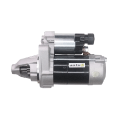The Vital Role of the Camshaft Position Sensor in Engine Performance
The camshaft position sensor (CPS) is a critical component in modern gasoline-powered vehicles, playing a vital role in optimizing the engine's efficiency and performance. This essential part of the engine management system provides real-time information to the car's computer, known as the Engine Control Unit (ECU), regarding the camshaft's position and rotational speed. This information allows the ECU to accurately manage the fuel injection and ignition timing, ensuring the engine operates at peak efficiency.
During engine startup, the camshaft position sensor plays a pivotal role in allowing the engine to start properly. The sensor's input is crucial for the ECU to establish the correct ignition and fuel injection timing, ensuring a smooth and reliable startup every time.
Additionally, the camshaft position sensor is crucial for the variable valve timing (VVT) system, which regulates the timing of valve lift events. This sophisticated technology improves the engine's performance, fuel efficiency, and emissions by optimizing valve timing according to driving conditions and engine load.
The Consequences of a Malfunctioning Camshaft Position Sensor
The camshaft position sensor (CPS) is an essential component for your vehicle's engine, supplying crucial information about the camshaft's position and speed to the Engine Control Unit (ECU). However, similar to other electronic devices, the CPS can wear out over time, and if it fails, it can cause various concerning symptoms that require attention.
Engine Difficulties - Rough Idling and Stalling: One of the initial indications of a failing CPS is often evident in the engine's performance. Drivers might notice rough idling, characterized by uneven engine running or difficulty maintaining a steady rpm. In more serious instances, the engine could stall unexpectedly, causing inconvenience and frustration for the driver.
Power Loss - Hesitation and Surging: When the CPS starts to malfunction, the ECU might receive incorrect or delayed data regarding the camshaft's position. This can cause the engine's timing to be incorrect, resulting in a noticeable decrease in power. Drivers may observe their vehicle hesitating or surging during acceleration, creating an inconvenient and potentially hazardous driving situation.
Ignition Issues - Difficulty Starting the Engine: The camshaft position sensor (CPS) is crucial in the engine's ignition process, supplying the ECU with essential data to ensure the spark plugs ignite at the correct moment. If the sensor begins to fail, the ECU may encounter challenges in timing the ignition correctly, resulting in difficulty or inability to start the engine.
Check Engine Light: One of the most frequent signs of a CPS issue is the activation of the check engine light on the vehicle's dashboard. This indicator serves as the ECU's method of notifying the driver about a problem with one or more engine sensors or components, including the crucial camshaft position sensor.
When the CPS begins to malfunction, it can have widespread consequences. The lack of precise information for the ECU to manage the engine's timing effectively can trigger a series of problems, resulting in diminished performance, lower fuel efficiency, and the possibility of eventual damage to other engine parts.
Can I Drive My Car with a Bad Camshaft Position Sensor?
It is generally not recommended to drive a car with a bad or failing camshaft position sensor (CPS).
The engine's computer might try to compensate for the sensor's failure by using default settings, but this could lead to lower performance, higher fuel usage, and the risk of additional damage.
Sometimes, the vehicle might activate a "limp mode" to prevent further harm, which can restrict the car's speed and overall performance. Persisting with driving in this state could result in more expensive repairs later on.
What Kills a Camshaft Sensor?
Several key factors that can contribute to the failure or premature wear of a camshaft position sensor (CPS):
Electrical Damage: Being an electronic part, the CPS is vulnerable to electrical problems like short circuits, corrosion, or damage caused by rodents chewing on the wiring. These electrical issues can interfere with the sensor's capability to send accurate data to the engine control module (ECM).
Mechanical Interference: Mechanical problems, like a loose timing chain or belt, can also affect the CPS. This physical interference may lead to the sensor giving incorrect readings regarding the camshaft's position and speed.
Wear and Tear: Similar to other parts of a vehicle, the CPS undergoes wear and tear with usage. As the sensor gets older, its capability to accurately detect and relay the camshaft's movements may diminish, eventually resulting in malfunction.
Contamination: The CPS is typically positioned in the engine's oil-rich surroundings, which exposes it to potential contamination. If engine oil leaks or seeps into the sensor's electrical connections, it can interfere with its operation and lead to early failure.
Overheating: Prolonged exposure to high temperatures, whether generated by the engine or external environmental conditions, can also accelerate the deterioration of the CPS. This heat-induced stress can lead to the gradual breakdown of the sensor's internal components.
Improper Installation or Replacement: Incorrect installation or replacement of the CPS during maintenance can result in problems like misalignment, inadequate grounding, or other installation-related issues, which may reduce the sensor's longevity.
Associated Diagnostic Trouble Codes (DTCs)
When a camshaft position sensor malfunctions, the ECU will record particular diagnostic trouble codes (DTCs) like P0340 or P0341, signaling a circuit issue with the sensor and warranting a diagnostic inspection.
Conclusion
Promptly addressing a failing camshaft position sensor is crucial for improved vehicle performance and can help prevent other engine-related problems. This sensor is essential in modern engines, and maintaining its health is essential for an optimal driving experience.
Instant Car Fix: Your Trusted Partner for Camshaft Position Sensor Maintenance and Repair
Our team at Instant Car Fix comprises skilled and knowledgeable technicians who specialize in diagnosing and servicing camshaft position sensors (CPS). Whether your vehicle is displaying signs of a failing CPS, like rough idling, reduced power, or starting troubles, or you're keen on proactive maintenance to prevent potential issues, our experts are well-equipped to handle the task effectively.
When your car's camshaft position sensor requires maintenance, don't be hindered by the inconvenience of traditional repair shops. Choose the convenience and expertise of mobile mechanics who can come to your location and swiftly restore your vehicle's functionality. With their specialized skills and the advantages of on-site service and warranty coverage, you can trust that your camshaft sensor repair will be handled with care.
Verified
Verified
Verified
Verified
Verified
Verified
Verified
Verified
Verified
Verified
Verified































